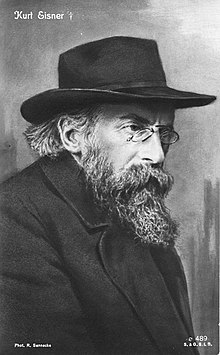
Back كورت أيسنر (سياسي ألماني) Arabic كورت ايسنر ARZ Eisner Kurt BAR Курт Эйснер Byelorussian Курт Айзнер Bulgarian Kurt Eisner Catalan Kurt Eisner Czech Kurt Eisner Danish Kurt Eisner German Κουρτ Άισνερ Greek
Kurt Eisner | |
|---|---|
 | |
| Minister President of the People's State of Bavaria | |
| In office 8 November 1918 – 21 February 1919 | |
| Preceded by | Otto Ritter von Dandl (as Chairman of the Council of Ministers) |
| Succeeded by | Johannes Hoffmann |
| Personal details | |
| Born | 14 May 1867 Berlin, Brandenburg, Prussia |
| Died | 21 February 1919 (aged 51) Munich, Bavaria |
| Nationality | German |
| Political party | Independent Social Democratic Party of Germany (1917–1919) Social Democratic Party of Germany (1898–1917) |
Kurt Eisner (German pronunciation: [kʊʁt ˈʔaɪsnɐ]; 14 May 1867 – 21 February 1919)[1] was a German politician, revolutionary, journalist, and theatre critic. As a socialist journalist, he organized the socialist revolution that overthrew the Wittelsbach monarchy in Bavaria in November 1918, which led to him being described as "the symbol of the Bavarian revolution".[2][1] He is used as an example of charismatic authority by Max Weber.[3] Eisner subsequently proclaimed the People's State of Bavaria but was assassinated by far-right German nationalist Anton Graf von Arco auf Valley in Munich on 21 February 1919.
- ^ a b "Kurt Eisner – Encyclopædia Britannica" (biography), Encyclopædia Britannica, 2006, Britannica.com webpage: Britannica-KurtEisner Archived 4 November 2007 at the Wayback Machine.
- ^ "The German Revolution's Bloody End".
- ^ Max Weber, (London 1987) p. 634